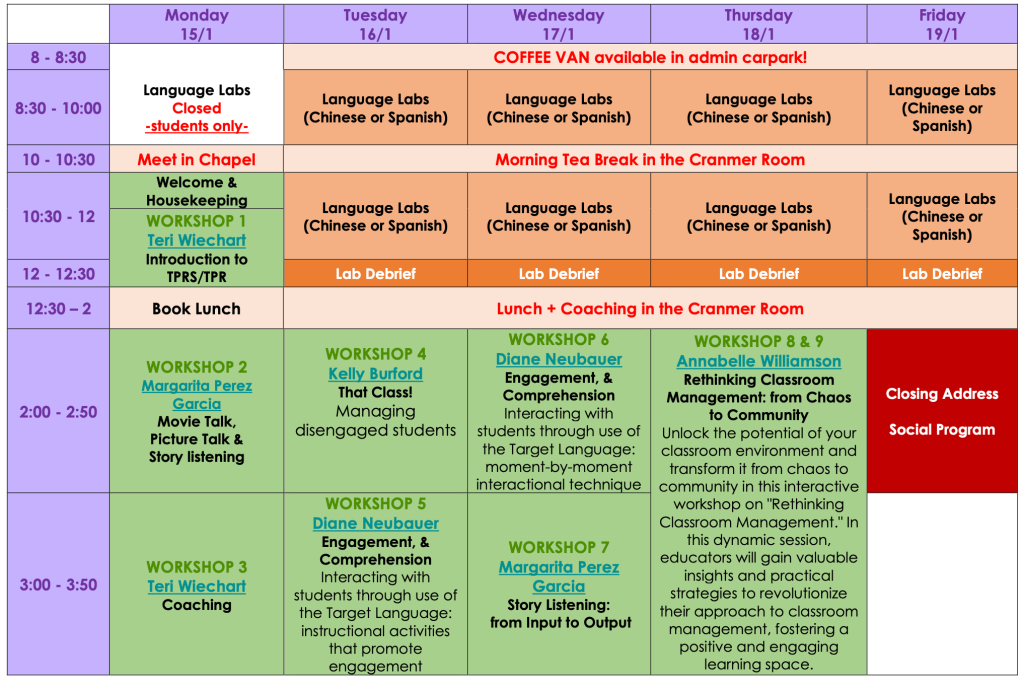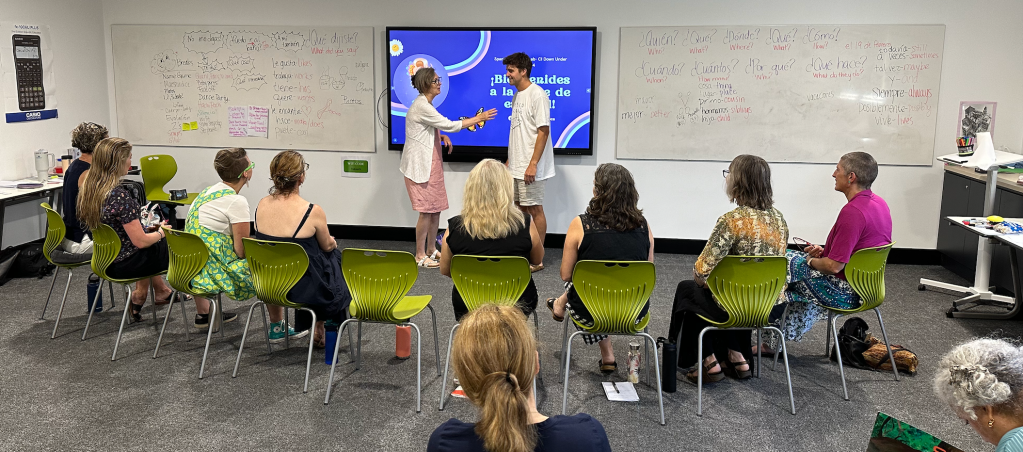It exceeded all of my expectations!! I hardly know where to start to share a few reflections, so let me . firstly start with with Diane Neubauer and Annabelle Williamson (La Maestra Loca), who had us all in absolute awe of their amazing CI teaching skills and their unflagging positivity. Diane and Annabelle both had a profound impact on the learners and observers in the labs.
Here is a comment shared by an attendee after dropping in on a language lab with Diane:
In a 90 minute lesson, I experienced moving from hearing at first only incomprehensible noise, before reaching sufficient comprehension towards the second half of the lesson where without realising it, I had pulled out my phone, following the instruction Diane had given to her students , and was googling where in Australia you can find pandas! I couldn’t believe it!
Secondly, I cannot go any further without thanking both Teri Wiechart and Margarita Pérez Garcia from the bottom of my heart. Both not only presented workshops (Teri in particular was superb – she delivered a truly amazing introduction to CI workshop after only a few days’ notice), they both also offered coaching and/or teaching support to anyone keen to dig deep and teach a new CI skill to ‘learners’. If you would like more information on the Coaches for Coaching course Teri runs, please comment below and I will put you in touch with Teri. I have done it twice and highly recommend it for anyone working in a leadership role in a language faculty.

As you can see from the conference prgram, the day was largely split into two sections. The 3 hour morning session was broken into 2 language labs, a break and then finished with the language lab debrief. The afternoon began with a 90 minute lunch/ coaching and finished with two workshops.

Language Labs
To my knowledge, this conference was the first ever in Australia to include language labs. The first language lab I attended was in Agen, France as a learner with Daniel Dubois in his Breton language lab. The second time I had the opportunity to go to language labs again was at iFLT18 in Cincinatti, Ohio. Here, I observed several labs with various teachers teaching a variety of languages ranging from Russian to Latin. It was memorable observing legendary teachers in action after many years of purely reading about them from afar. While I observed several labs over this week, only one made a deep and lasting impression. Read all about it here!!
Language Labs are significantly better (in my opnion) than workshops for learning how to improve your teaching practise. Instead of someone presenting a workshop explainingstep by step hot to do a skill using PowerPoint, in a language lab, you can either experience learning the skill as a learner or watch it being taught as an observer. Often, explanations leaves out an important detail, yet when you have the chance to see a skill or activity being explained to a class of learners, the instructions are considerably clearer. Thus, after observing 12 hours of language labs, the skills, ideas and learning we attendees experienced far exceeded that which would have been covered through12 hours of individually presented workshops. Observing language teaching with real learners is the most complete way for us language teachers to improve our practice. Language labs also provide teachers with the opportunity to hear from the learners, a rare yet valuable aspect. After the second lab each day, a debrief is held. During this half hour, both learners and observers can reflect and share their experiences or interact with the teacher to either ask questions or comment. Annabelle wrote notes with hyperlinks during the debriefs which she shared with all attendees. WooHoo!

After one week back, here is a list of what I have tried already:
- Classroom Jobs
Instead of making a big deal out of assigning jobs as I used to do, I am imitating Annabelle’s style and assigning the jobs as I need them and choosing someone intentionally rather than randomly through class dojo. It gives me such joy watching my students face when I match them with a job. This is also a much quicker process, which with only one lesson per week, is an added bonus. So far, I have a door closer, a time keeper (my new classroom clock randomly stops, so I asked a student to give me a heads up when we had 10 mins left of the lesson). The job I can’t wait to assign is the clicker person. This person will be responsible for keeping an eye out for where I put the clicker down. When I ask, “Dimana kliker” (Where is the clicker), they will remain seated, and point to my laser pointer saying either ‘disini’ (here) or ‘disana (there). This job is pure genius. - Turn and Talk
This is the perfect comprehension check or brain burst (mini brain break) and was amazing introducing it during week one. After I explained what students do when they hear me say ‘diskusi’ (discuss) + see my fingers doing crab claws, (insert the ASL crab claw) pic I said to the class twice, “Bu Cathy mau satu stick”. I paused and then did crab claws while repeating diskusi + Bu Cathy mau satu stick very slowly several times. After a few seconds, I next said someone’s name, followed by saying ‘Bahasa Inggris?’ (English?) and then the Indonesian sentence again. Like this, “Lyla, Bahasa Inggris ya? Bahasa Inggris. Bu Cathy mau satu stick. Lyla then translated it into English, Bu Cathy wants a stick. What a fabulous way to hold comprehension checks on familiar structures after a long holiday break. - The name game (add link) Tried this brain break with my year three students and they loved it. For week one, I had the whole class playing in one group, but now that they know how it runs, I will break them into smaller groups next week which will definitely increase engagement even more!!



